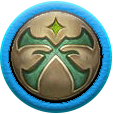
Steam Knight [one-action] Feat 6Composite Fire Impulse Kineticist Primal Stance Water Source Rage of Elements pg. 37 2.0
You shape your kinetic aura into swirling armor of steam that scalds your enemies and propels you on super-heated jet streams. A creature can take damage from Steam Knight only once per round. Your steam armor has the following effects.
- You gain a +10-foot status bonus to your Speed.
- When you Leap, you can jump up to your Speed. You don't immediately fall at the end of a jump, provided you Leap again with your next action. If you Leap over a creature and come within 10 feet, that creature takes 2d6 fire damage with a basic Reflex save against your class DC.
- At the start of each of your turns, you can emit steam as a free action. It deals 2d6 fire damage to each creature in your kinetic aura with a basic Reflex save against your class DC. A creature that fails is also pushed 5 feet.
Level (+5) The fire damage from a jump or blast of steam increases by 1d6.
Traits
Composite: A composite impulse combines multiple elements. You can gain an impulse with the composite trait only if your kinetic elements include all the elements listed in the impulse's traits.
Fire: Effects with the fire trait deal fire damage or either conjure or manipulate fire. Those that manipulate fire have no effect in an area without fire. Creatures with this trait consist primarily of fire or have a connection to magical fire.
Planes with this trait are composed of flames that continually burn with no fuel source. Fire planes are extremely hostile to non-fire creatures. Unprotected wood, paper, cloth, and other flammable materials catch fire almost immediately, and creatures wearing unprotected flammable clothing catch fire, typically taking 1d6 persistent fire damage. Extraplanar creatures take moderate environmental fire damage at the end of each round (sometimes minor environmental damage in safer areas, or major or massive damage in even more fiery areas). Ice creatures are extremely uncomfortable on a fire plane, assuming they don’t outright melt in the heat.
Impulse: The primary magical actions kineticists use are called impulses. You can use an impulse only if your kinetic aura is active and channeling that element, and only if you have a hand free to shape the elemental flow. The impulse trait means the action has the concentrate trait unless another ability changes this. If an impulse allows you to choose an element, you can choose any element you're channeling, and the impulse gains that element's trait.
Primal: This magic comes from the primal tradition, connecting to the natural world and instinct. Anything with this trait is magical.
A creature with this trait is primarily constituted of or has a strong connection to primal magic.
Stance: A stance is a general combat strategy that you enter by using an action with the stance trait, and you remain in for some time. A stance lasts until you get knocked out, until its requirements (if any) are violated, until the encounter ends, or until you use a stance action again, whichever comes first. After you take an action with the stance trait, you can’t take another one for 1 round. You can enter or be in a stance only in encounter mode. You can Dismiss a stance.
Water: Effects with the water trait either manipulate or conjure water. Those that manipulate water have no effect in an area without water. Creatures with this trait consist primarily of water or have a connection to magical water.
Planes with this trait are mostly liquid. Visitors who can’t breathe water or reach an air pocket likely drown. The rules for aquatic combat (Player Core 437) usually apply, including the inability to cast fire spells or use actions with the fire trait. Creatures with a weakness to water take damage equal to double their weakness at the end of each round.